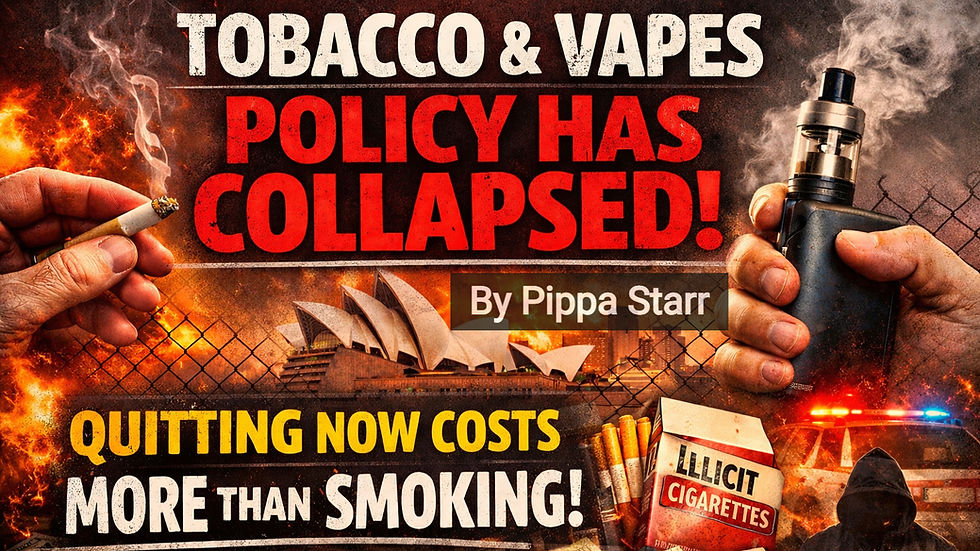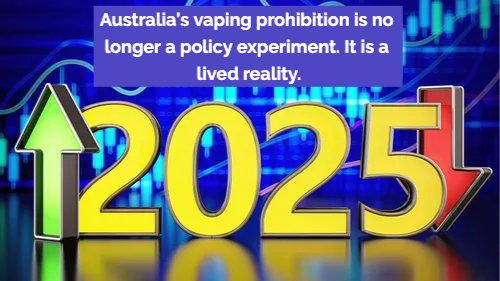When Health Becomes Policing: The Minns Government’s War on Landlords
- Alan Gor

- Nov 11, 2025
- 5 min read

Alan Gor 11 November 2025
Australia’s nicotine policy is spiralling into absurdity. The Minns Labor Government has announced new legislation that will make landlords criminally liable if their tenants are caught selling illicit tobacco or vapes.
Under the Public Health (Tobacco) Amendment (Landlord Offences) Bill 2025, landlords who “knowingly permit” tenants to sell illegal products face up to one year in prison or fines of $165,000.
It’s being sold as a “public health measure.” But this isn’t health policy, it’s desperation disguised as lawmaking. Rather than addressing the structural causes of the illicit market, the government is simply expanding the list of people it can punish.
The Black Market They Built
Let’s not rewrite history. The explosion of illegal tobacco and vaping products in Australia is a policy-driven disaster.
The government created the perfect storm:
World’s highest cigarette taxes (around $1.50 per stick, with annual increases).
A ban on legal nicotine vapes, replaced with an unworkable prescription-only model.
Patchy enforcement that focuses on seizures and fines rather than regulation.
The result? A multi-billion-dollar black market that’s now violent, organised, and out of control.
According to a 2025 report by the Australian Criminal Intelligence Commission (ACIC) and the Australian Institute of Criminology (AIC), the illicit tobacco trade in Australia was worth $4 billion in 2024, up from $1 billion in 2021.
That’s a 400% increase in just three years.
The same report detailed over 250 arson attacks, along with murders, kidnappings, and extortion connected to turf wars among organised crime syndicates.
Criminologist Dr James Martin from Deakin University said it best:
“Australia is a guinea pig. We have pushed these policies further than anyone else. Now we are reaping the very obvious rewards.”
In other words, the government’s approach has done exactly what prohibition always does drive trade underground and empower criminal networks.
Blaming the Landlord
So what does the Minns Government do in response? It blames landlords.
Under the new bill, a property owner could face prosecution if they knew their tenant was selling illicit tobacco or vapes and didn’t act to evict or report them.
The logic is absurd. How is a landlord supposed to verify what a tenant is doing day-to-day? Will they now be expected to run private investigations, send in mystery shoppers, or physically inspect stockrooms?
Even if a landlord suspects something, they’re not law enforcement; they’re not equipped to collect evidence or issue closure orders. Yet under this law, inaction becomes a crime.
It’s easy politics: shift the blame from policy failure to individual accountability. But it’s terrible governance.
This legislation won’t dismantle the illicit trade; it’ll just make property owners paranoid. Small business tenants will find it harder to lease premises. Legitimate tobacconists and mixed retailers will be treated with suspicion. And the real criminals will move to less visible locations, private homes, warehouses, or online, where oversight is even weaker.
Public Health as Punishment
The rhetoric is always the same: “We’re protecting the community.” But Australia’s public health bureaucracy has drifted far from protection. It has become a system of punishment.
Rather than empowering smokers with safer, regulated options, it criminalises nicotine use unless it fits a narrow moral framework.
If you want to quit with nicotine replacement gum fine.
If you want to quit smoking with vaping, you need a prescription, a pharmacy visit, and good luck finding one willing to help.
And if you don’t? You’re pushed straight into the arms of the black market.
When that black market grows (as it inevitably does), the government blames “greedy retailers,” “criminal syndicates,” or now, “negligent landlords.” But it never blames the prohibitionist policies that caused it in the first place.
This is cognitive dissonance at a policy level, a refusal to connect cause and effect because doing so would mean admitting failure.
The Missed Opportunity: Harm Reduction
The saddest part is that there’s a proven alternative.
Across Europe, the UK, and parts of North America, governments have embraced tobacco harm reduction, allowing adult smokers to access safer nicotine products such as vapes, pouches, and heated tobacco.
The results are extraordinary:
Sweden is on track to become the first smoke-free country in the world, thanks to widespread use of nicotine pouches and snus.
The UK actively promotes vaping as a quit tool through the NHS, even giving free starter kits to smokers.
New Zealand, before reversing its policies under political pressure, saw record-low smoking rates while allowing open access to nicotine alternatives.
These countries didn’t have to arrest landlords, shut down stores, or raid tobacconists to achieve progress. They trusted adults to make informed choices, and it worked.
Australia, meanwhile, has chosen the opposite path: moral panic, pharmaceutical gatekeeping, and criminal enforcement. The result? More crime, more chaos, and more smoking.
A Law Born of Fear, Not Logic
Health Minister Ryan Park says the bill will “minimise opportunities for illegal tobacco and vape sales to flourish.” But that’s fantasy. The black market exists because there is no functioning legal market.
You can’t “minimise opportunities” when you’ve created a monopoly for criminals.
Australia has reached the limit of what can be achieved through price and punishment. Yet instead of pivoting to harm reduction, governments double down on coercion.
This is not public health, it’s moral policing with bureaucratic branding.
Follow the Incentives
It’s worth asking who benefits from keeping nicotine tightly controlled. Pharmaceutical companies profit from expensive prescription-only nicotine products. Anti-tobacco NGOs receive ongoing government funding for “education” campaigns. Politicians get to appear tough and virtuous without tackling the underlying demand.
The losers are ordinary Australian smokers who can’t afford $40 cigarette packs, ex-smokers who can’t legally access the safer products that helped them quit, and small retailers caught in the crossfire.
Now, landlords join that list, too.
The Real Way Out
There’s only one sustainable path out of this mess: re-regulate the nicotine market.
Bring vapes and nicotine pouches into the same legal framework as alcohol or over-the-counter medications, age-restricted, taxed, and quality-controlled. That would undercut criminal profits overnight while preserving adult choice and reducing harm.
The data is clear: prohibition doesn’t reduce demand; it only shifts it. If policymakers really care about health, they’ll stop criminalising human behaviour and start meeting people where they are with honesty, compassion, and practical options.
Health Policy or Social Control?
The Minns Government’s new landlord law is a symbol of how far Australia’s public health establishment has drifted from its mission. It’s not about helping people quit or reducing harm; it’s about control, optics, and punishment.
Every time the government blames someone new, smokers, retailers, or now landlords, it confirms one thing: they’ve lost control of the narrative and the market.
Until Australia admits that its prohibitionist model is the problem, not the solution, the cycle will continue. More raids. More arrests. More violence. More hypocrisy.
And fewer people helped to actually quit.
Because you can’t build a healthy society on fear and fines. You can only do it by respecting reality and human behaviour.


